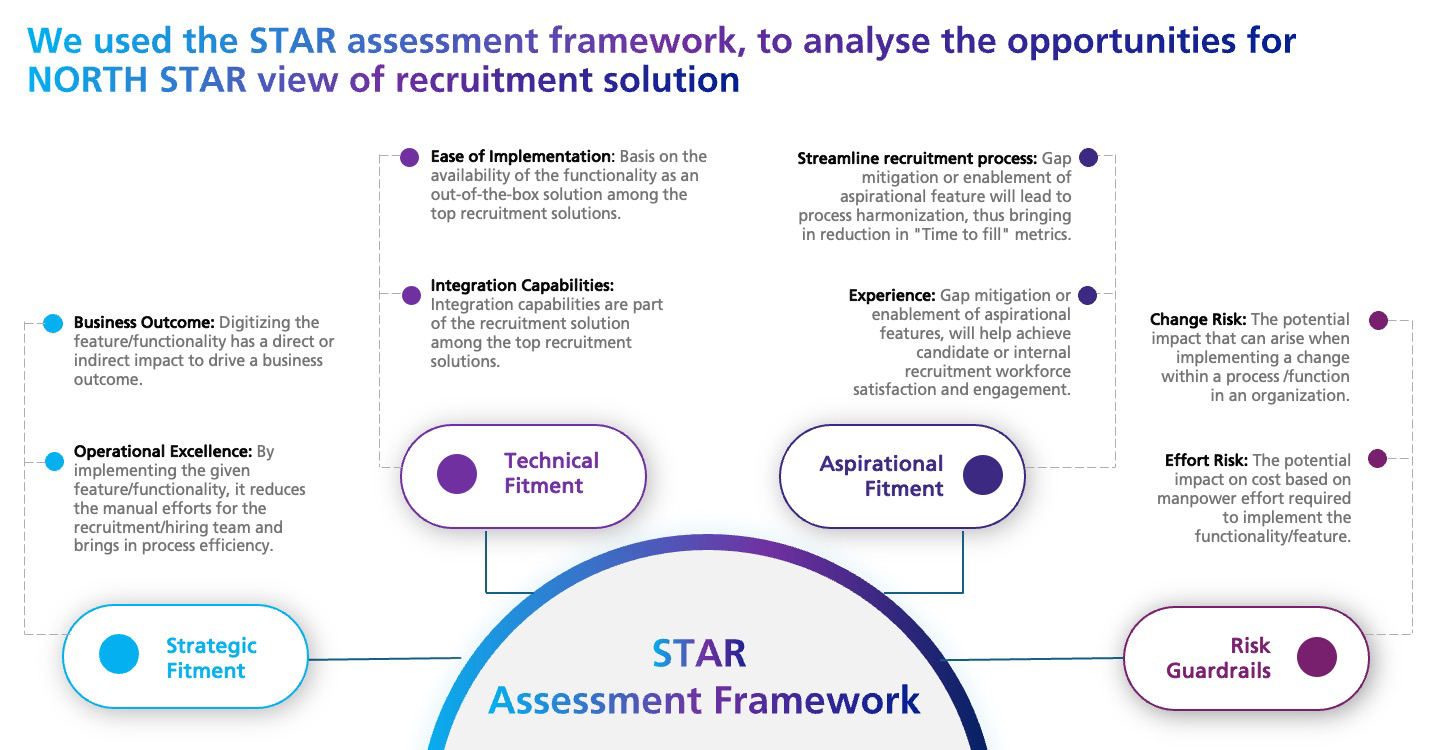Client overview
The client was a global development bank that aimed to reduce poverty and foster sustainability in developing nations. It operates across 145 countries with over 12,000 full-time employees. Through a combination of financial support, technical assistance, and policy guidance, it provides tailored solutions to meet the unique needs of its member countries. By investing in critical areas such as infrastructure, education, and healthcare, the institution drives innovation and empowers nations to achieve long-term prosperity and stability.
Need for change
Many modern enterprises have outdated legacy systems that slow down their recruitment process. This is driving a wave of digital transformation to modernize their talent acquisition strategies. Such modernization encompasses:
- Assessing recruitment workflows to understand the current hiring approach and bottlenecks.
- Evaluating the technology landscape to identify inefficiencies in existing tools and platforms.
- Detecting gaps and opportunities within the enterprise’s talent acquisition ecosystem.
- Providing industry insights and best practices for modern recruitment strategies.
- Enhancing candidate engagement by focusing on innovative experiences tailored to candidates’ needs.

Challenges
We identified multiple challenges in the client’s legacy system that significantly impacted recruitment processes and experiences:
Requisition inefficiencies
40% of requisitions lacked complete and accurate details, and this created delays early in the recruitment cycle.
Lack of critical functionalities
Missing features and lengthy change processes obstructed flexibility, delaying business hiring needs.
Time inefficiencies
15% of the targeted “time to fill” was consumed during the longlisting process– a major hindrance to filling roles promptly. Moreover, 10-day delays in issuing offer letters due to approval roadblocks further prolonged the hiring timeline.
Data and operational limitations
80% of reporting delays stemmed from fragmented systems and dependency on multiple platforms.
Experience gaps
Candidates and internal stakeholders faced diminished experiences due to operational inefficiencies, leading to frustration and disengagement.
Clearly, the status quo was no longer sustainable. A cohesive, advanced solution was needed to address these gaps and drive modern, scalable talent acquisition processes.
Our Solution Paradigm
To tackle these challenges, we applied a strategic fitment framework, an approach designed to align strategic, technical, and aspirational goals while minimizing risks. Through this framework, we outlined the North Star vision for a modernized talent acquisition ecosystem. This roadmap featured three key phases:

Our Offerings
-

Foundational
- Leadership alignment
- Defining measurable talent acquisition KPIs
- Process harmonization by standardizing workflows
- Scalable and robust technical architecture development
-

Converged
- Craft optimal user journeys
- Drive operational excellence through automation and Integration
- Leverage personalization to enhance candidate experience
-

Accelerate
- Empower with intuitive solutions
- Expand channel strategy
- Renew onboarding experience
- Leverage data for improved reporting and analytics
Strategic Execution Plan
LTIMindtree Interactive followed a 5-step roadmap to guide the organization in this talent acquisition framework:
- Strategic alignment: Synchronized with leadership and key stakeholders.
- Opportunity list creation: Identified quick-win opportunities and long-term strategic goals.
- Exploring market options: Evaluated current talent acquisition technologies and identified the best-fit tools.
- Proof of concept: Piloted next-gen AI applications for talent acquisition such as generative AI for job descriptions and candidate outreach.
- Execution: Developed a detailed implementation timeline, prioritizing high-impact areas first.
Business benefits
Our framework and guidance for a unified recruitment suite and phased roadmap will achieve high-level benefits including:
-
Reduced ‘time-to-fill’
Automation and system integrations will improve operational efficiencies, reducing time-to-fill a position from 90 days to 75 days.
Read More -
Lower candidate bounce rate
Enhancing the candidate experience through personalized insights and seamless application workflows by leveraging design principles to reduce bounce rate from 64.07% to 40% or lower as per the market benchmark.
Read More -
Higher talent quality
Advanced sourcing capabilities to attract a diverse and high-quality talent pool from untapped segments will increase the candidate footfall by 20%–30%.
Read More -
Improved monitoring
Real-time analytics and reporting to provide visibility into metrics like time-to-hire, cost-per-hire, and satisfaction scores, enabling swifter, informed decision-making.
Read More -
Enhanced stakeholder experience
Streamlined recruitment processes and a unified solution to boost candidate engagement and enable key stakeholders to focus on qualitative tasks.
Read More
Conclusion
Through strategic planning and innovative thinking, we provided the client with a comprehensive talent acquisition transformation framework that streamlined and digitally transformed their recruitment processes. Our explore, extend, and exclusive (3E) approach offered a customizable blueprint for immediate implementation, ensuring the client could close recruitment gaps while preparing for future challenges.
By adopting the new horizon talent acquisition strategy, the client improved operational efficiency and also redefined their approach to hiring talented professionals who align with their mission of reducing poverty and fostering global development.
Are you ready to transform your talent acquisition strategy? Contact us today to unlock your workforce’s potential!.








